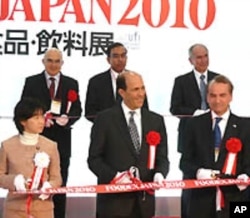This month, the United States and Japan are celebrating more than 50 years of cooperation in agriculture. On March 2, at the FoodEX Japan, the largest food trade show in Asia, U.S. Ambassador to Japan John Roos kicked off an exciting series of events entitled "Partners in Agriculture."
Organized jointly by the U.S. Department of Agriculture's Foreign Agricultural Service Japan, various U.S. states including Iowa, Nebraska, several U.S. agricultural trade organizations, and the Japanese Prefecture of Yamanashi, the program is scheduled for March through mid-summer of this year.
Japan's partnership with the United States can be traced back more than 50 years to the famous "hog lift" [an airlift of hogs] of 1959. After Yamanashi Prefecture was devastated by 2 typhoons, farmers from the state of Iowa assisted Yamanashi farmers in rebuilding Japan's hog industry by donating and transferring hogs to repopulate the prefecture. Since that time the livestock industry in Japan has developed alongside the Japanese economy, reflecting the evolving tastes and growing purchasing power of the Japanese consumer.
Partnership was the aim in 1951 when the U.S. Embassy worked with the Japanese Ministry of Agriculture to help establish the U.S. program known as the Association for International Collaboration of Farmers, now referred to as the Japan Agricultural Exchange Council. The Association's mission is to help Japanese farmers learn about agricultural techniques in the United States and bolster U.S.-Japan cooperation. Since 1952, over 12,000 Japanese farmers have gone to the U.S. and returned to Japan with new ideas, new business contacts, and a better understanding of the United States.
The United States is the most reliable foreign supplier of high-quality agricultural products to Japan, and Japan's purchases have been essential to the health of the U.S. economy. In 2008, Japan purchased approximately $14.7 billion worth of grains, oilseeds, meats, dairy, and other food products from the U.S., making Japan our third largest agricultural export market.
While the U.S.-Japan agricultural relationship is strong and growing, both governments continue to discuss ways to enhance market access that is both science-based and commercially viable for producers of agricultural and livestock exports such as U.S. beef, rice, fruits, and vegetables.
Japan's food security stands upon two pillars -- domestic production and a reliable source of imports. As Ambassador Roos noted, "Our partnership in agriculture is an example of the close bond between our 2 countries."
Organized jointly by the U.S. Department of Agriculture's Foreign Agricultural Service Japan, various U.S. states including Iowa, Nebraska, several U.S. agricultural trade organizations, and the Japanese Prefecture of Yamanashi, the program is scheduled for March through mid-summer of this year.
Japan's partnership with the United States can be traced back more than 50 years to the famous "hog lift" [an airlift of hogs] of 1959. After Yamanashi Prefecture was devastated by 2 typhoons, farmers from the state of Iowa assisted Yamanashi farmers in rebuilding Japan's hog industry by donating and transferring hogs to repopulate the prefecture. Since that time the livestock industry in Japan has developed alongside the Japanese economy, reflecting the evolving tastes and growing purchasing power of the Japanese consumer.
Partnership was the aim in 1951 when the U.S. Embassy worked with the Japanese Ministry of Agriculture to help establish the U.S. program known as the Association for International Collaboration of Farmers, now referred to as the Japan Agricultural Exchange Council. The Association's mission is to help Japanese farmers learn about agricultural techniques in the United States and bolster U.S.-Japan cooperation. Since 1952, over 12,000 Japanese farmers have gone to the U.S. and returned to Japan with new ideas, new business contacts, and a better understanding of the United States.
The United States is the most reliable foreign supplier of high-quality agricultural products to Japan, and Japan's purchases have been essential to the health of the U.S. economy. In 2008, Japan purchased approximately $14.7 billion worth of grains, oilseeds, meats, dairy, and other food products from the U.S., making Japan our third largest agricultural export market.
While the U.S.-Japan agricultural relationship is strong and growing, both governments continue to discuss ways to enhance market access that is both science-based and commercially viable for producers of agricultural and livestock exports such as U.S. beef, rice, fruits, and vegetables.
Japan's food security stands upon two pillars -- domestic production and a reliable source of imports. As Ambassador Roos noted, "Our partnership in agriculture is an example of the close bond between our 2 countries."





